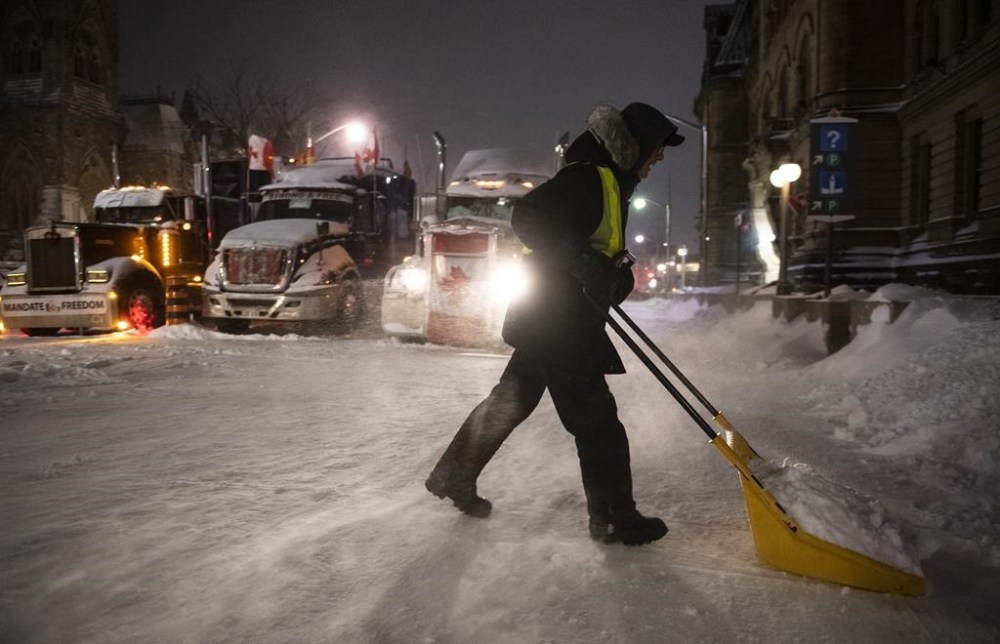Most funds raised for ‘Freedom Convoy’ protest were returned or confiscated
Advertisement
Read this article for free:
or
Already have an account? Log in here »
To continue reading, please subscribe:
Monthly Digital Subscription
$0 for the first 4 weeks*
- Enjoy unlimited reading on winnipegfreepress.com
- Read the E-Edition, our digital replica newspaper
- Access News Break, our award-winning app
- Play interactive puzzles
*No charge for 4 weeks then price increases to the regular rate of $19.00 plus GST every four weeks. Offer available to new and qualified returning subscribers only. Cancel any time.
Monthly Digital Subscription
$4.75/week*
- Enjoy unlimited reading on winnipegfreepress.com
- Read the E-Edition, our digital replica newspaper
- Access News Break, our award-winning app
- Play interactive puzzles
*Billed as $19 plus GST every four weeks. Cancel any time.
To continue reading, please subscribe:
Add Free Press access to your Brandon Sun subscription for only an additional
$1 for the first 4 weeks*
*Your next subscription payment will increase by $1.00 and you will be charged $16.99 plus GST for four weeks. After four weeks, your payment will increase to $23.99 plus GST every four weeks.
Read unlimited articles for free today:
or
Already have an account? Log in here »
Hey there, time traveller!
This article was published 03/11/2022 (1135 days ago), so information in it may no longer be current.
OTTAWA – An investigation has found that most of the $25 million raised by the “Freedom Convoy” was either returned to donors or ended up in an escrow account awaiting the results of a civil lawsuit.
The Public Order Emergency Commission, the public inquiry tasked with looking into the federal government’s use of the Emergencies Act during the protests, investigated what happened to donations made through e-transfers, cryptocurrency and fundraising platforms such as GiveSendGo and GoFundMe.
A report released by the commission Thursday shows that only about $1 million was actually spent by the convoy’s various organizers.

One of the convoy’s leaders told the commission in an interview that they distributed $20,000 in donations to truckers each day of the protest, often by handing out envelopes of $2,000 in cash.
Approximately $18 million was refunded to donors, while the rest was confiscated and put into a third-party fund pending civil court cases.
The $6.2 million that is now in escrow mostly came from online fundraisers by Tamara Lich, one of the protest’s main organizers, and cryptocurrency captured by authorities.
Crowdfunding efforts led by Lich raised nearly $10.1 million from more than 120,000 donors before donations were suspended by GoFundMe and returned.
GoFundMe raised concerns about the fundraiser almost immediately because money was coming in so fast. The company was particularly concerned about whether the organizers could abide by its terms, which stipulated that funds needed to be distributed quickly according to the description provided to donors.
Later, the company communicated with Ottawa’s mayor and then-deputy police chief, and both contested the legality of the protest.
“All refunds were initiated via our payment processing partner, including all transaction processing fees and tips, and those funds were returned to donors in the subsequent days,” GoFundMe said in a written statement in early February.
More than $12 million was raised for the protesters via fundraisers on the platform GiveSendGo. However, its co-founder and chief financial officer, Jacob Wells, said during a March 9 court appearance that those donations would also be returned. The commission’s report says the majority of donations were indeed refunded.
About $800,000 worth of bitcoins were distributed to protesters. About half of what was raised was moved into escrow between March 7 and 22, but authorities have not been able to recover the rest.
Lich also solicited donations by e-transfer. She told the commission Thursday that most of the money that was spent was used to purchase fuel.
A summary of an interview with “Freedom Convoy” treasurer Chad Eros, which was submitted into evidence at the commission, says the idea to create a non-profit organization to accept donations came from former Conservative Party of Canada MP Russell Hiebert.
Eros helped create the “Freedom 2022 Human Rights and Freedoms” group to collect payments so that donations would no longer land in Lich’s personal bank account. He also worked with Wells to establish the fundraiser on GiveSendGo.
Because convoy organizers were having difficulty setting up their own accounts to collect donations, Wells then agreed to use his own payment processing services, promising to transfer the funds back to organizers, he said in court.
Keith Wilson, a lawyer working with the Justice Centre for Constitutional Freedoms who was supporting the organizers, agreed to use his own trust account to collect payments in Canada, the commission’s report says.
But a payment processor prevented money from being transferred into Wilson’s trust account, and ultimately a civil injunction stopped the funds from moving altogether.
The commission also investigated whether any of the money came from foreign sources.
It found that 86 per cent of the donations to the main GoFundMe campaign originated in Canada, and 11 per cent came from the United States.
Of the nearly US$10 million raised through the main GiveSendGo campaign, 47 per cent originated in Canada and 47 per cent in the United States.
According to information provided by GiveSendGo, the “Freedom Convoy 2022” campaign had 113,152 donors.
More than half of donations to that campaign — 59 per cent — were from the United States, and about 35 per cent were from Canada.
More than 6,300 donations, making up more than half a million dollars, came from other countries.
This report by The Canadian Press was first published Nov. 3, 2022.


